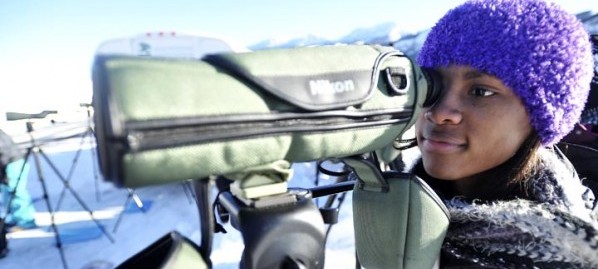This post originally appeared on the The Bozeman Daily Chronicle.
YELLOWSTONE NATIONAL PARK – Peering through a spotting scope at a gray wolf lying under a tree in the Lamar Valley, Kwanetta Davis smiled.
“Awesome,” the 17-year-old Dallas girl said.
Davis and nine other Dallas high school seniors went wolf watching Tuesday as part of a five-day trip here to learn about the wilderness – a rarity in their inner-city lives.
The students are part of the Turner Twelve, a group of a dozen students who grew up in a rough part of the Texas metropolis. But with help from mentors and support from philanthropists, the students have been taught for years that college is within their reach.
“The message that we try to develop in them is that they are the agents of change,” John Carter, a former teacher and coach who founded the program, said this week in a phone interview from Dallas.
The program is named for the now-defunct, 294-unit Turner Courts public housing project in South Dallas. Carter, who grew up in a housing project himself, founded the Turner Twelve 10 years ago after checking statistics and discovering that in the 1990s, only six kids from Turner Courts had attended college.
The original Turner Twelve all graduated from high school and 11 of them went to college.
Students are chosen for the program in sixth-grade. They must live within about five miles of the former Turner Courts and write an essay about why they want to be part of the Turner Twelve. Students graduating from the program help choose the incoming group.
Parents and students sign a contract promising to maintain a 3.5 grade-point average and attend school 90 percent of the time. Students also participate in community service projects and extracurricular activities.
The kids are also matched up with professionals in career fields they’re interested in and sent on trips to discover possibilities that may await them.
Of the group here Tuesday, only two of the students come from two-parent homes. Yet, the group also boasts the top two students in their roughly 300-person senior class.
Between snapping photos of the gray wolf, Davis said she’s 15th in her class.
“I was third last year,” she said, seemingly embarrassed.
Davis has acceptance letters from a half-dozen colleges across the country. She’s still waiting to hear about possible scholarship awards.
She wants to be a neonatal nurse.
“I was a preemie, so I want to give back to families like they gave back to my family,” she said, her tiny, 5-foot-tall frame bundled up in warm clothes she had borrowed for the trip. When she was born, she weighed 3 pounds.
The Turner Twelve, Davis said, “makes me see that everything is possible in life.”
Another student in the group, Ivory Alexis, 17, has the second-highest grade-point average in his class. From the time he was 11 to 15 years old, his dad was in jail.
Alexis said Tuesday that he wants to be a lawyer. He’s hoping to attend Stony Brook University in New York.
“(The Turner Twelve) helped me mature as a young man more than anything,” he said.
Students toured the park Tuesday in a bus guided by a Yellowstone Association instructor. Anonymous donors helped pay for their trip, organizers said.
Just seeing this much snow was a first for the group. During bus stops, students made snow men. In Dallas, the students said, temperatures have been in the 70s.
After observing the gray wolf, park wolf specialist Rick McIntyre demonstrated his radio-tracking device to the students, letting them hear the beeps from the wolf’s collar that had allowed him to locate the pack that morning.
“That happens to be the signal from the Alpha male 755,” McIntyre explained, launching into the history of wolves in the park.
McIntyre, who gets up at dawn to track the park’s wolves, told students how park rangers used to kill wolves to manage the park’s wildlife population and how wolves were later reintroduced to the park.
The wolf the students saw, McIntyre told them, is a fifth-generation descendant from a pair of wolves reintroduced to the park in 1996.
Standing in 10-degree weather for the lesson, the students listened intently. They asked questions when McIntyre was finished.
That’s the goal of the Turner Twelve, Carter said, to take disadvantaged youths and “challenge them to take education seriously.”

